Steps need to be taken in the farming industry to close the growing disconnect between primary producers and consumers, members of the NI Institute of Agricultural Science (NIIAS) were told last week.
Speaking at the organisation’s annual conference in Templepatrick, Kildare dairy farmer and Nuffield scholar Brian Rushe said that misinformation about farming from “anti-agriculture activists” has the potential to damage the industry.
He told NIIAS members that some animal welfare and environmental campaigners purposely play on the fears and emotions of the public to discredit farming. He gave the example of a recent anti-dairy farming campaign, which focused on social media and with adverts taken out in newspapers and billboards.
“It is impossible for an average consumer to filter the truth from the massive volume of information contained in a single Google search,” he said.
Rushe studied public perception of agriculture during his Nuffield scholarship and was critical of the industry at all levels in not recognising consumers as an important stakeholder.
He said that farmers had a “social licence” and described this as the level of public trust granted to a sector by the community and its consumer base. “Social licence is slow to be granted, but quick to be lost,” Rushe said.
Values
His advice for improving the connection between farmers and consumers was to communicate shared values.
“Campaigners will say farmers are cruel and profit driven, but all I want to do is provide for my family, everyone is the same,” Rushe said.
He recommended getting influential people such as celebrities and bloggers to visit farms and tell their followers about the work that farmers do.
Rushe said that farmer spokespeople shouldn’t always be farm organisation leaders, but should be ordinary farmers to allow a better connection with the public.
Also speaking at the event, Asda NI corporate affairs manager Joe McDonald advised farm organisations and food companies to listen more to consumers by holding discussion groups with members of the public. “You need to understand what makes them tick so that you can engage and communicate effectively with them,” McDonald said.
Joe McDonald told NIIAS members last week that surveys by Asda consistently show that consumers expect retailers to sell local products and support British farmers. However, he pointed out that price and quality are the main factors influencing buying decisions.
McDonald said this meant retailers were “dreading the dilemma” of potentially having the option of selling cheap food from third countries after Brexit.
It was suggested by both Joe McDonald from Asda and Kildare farmer Brian Rushe that food labelling could be simplified to make the origin and quality assurance standard of products clearer to consumers.
“Why do labels usually focus on what its free from, instead of what’s in it. I would be afraid that a ‘GM-free’ trend could emerge in the future,” Rushe said.
He also raised concerns that some marketeers promoting food from Irish farms are portraying an image that could be hard for farmers to live up to. “We can’t push the green image too far,” he maintained.






 This is a subscriber-only article
This is a subscriber-only article









SHARING OPTIONS: